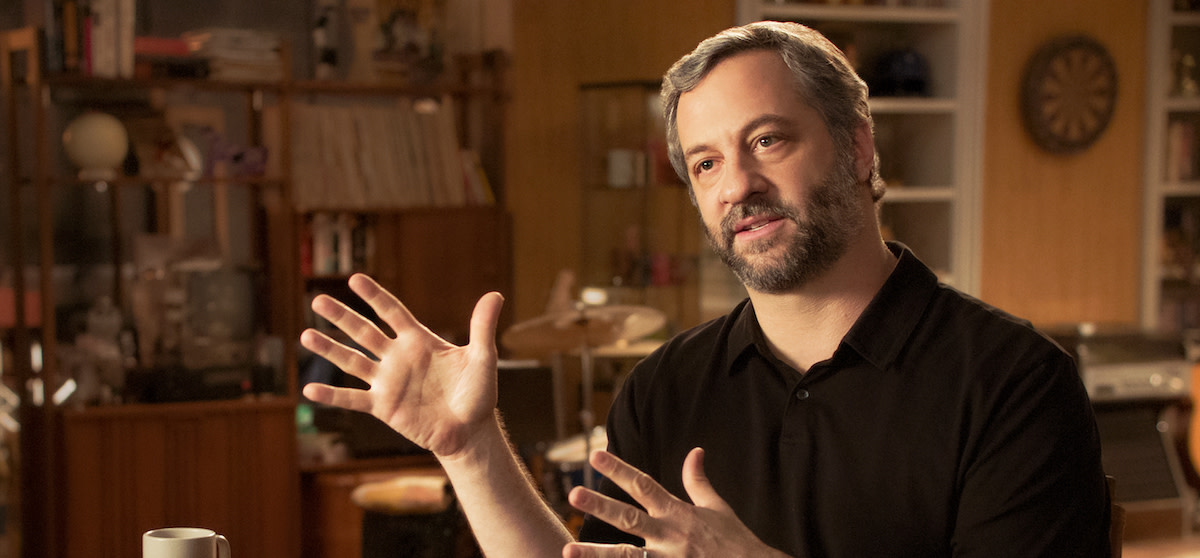Judd Apatow’s Career Trajectory

Judd Apatow’s journey to becoming a comedic powerhouse is a testament to his talent, hard work, and ability to capture the essence of modern relationships. From his humble beginnings in stand-up comedy and television writing to his success as a film director and producer, Apatow has carved a unique path in the entertainment industry, leaving an undeniable mark on contemporary comedy.
Early Career and Influences
Apatow’s career began in the late 1980s, fueled by his passion for stand-up comedy. His early years were marked by gigs in clubs and open mic nights, honing his comedic timing and observational skills. His stand-up routine often revolved around relatable experiences, particularly those centered around relationships and the awkwardness of everyday life. This foundation in stand-up comedy laid the groundwork for his future success, providing him with a keen understanding of humor and the ability to connect with audiences on a personal level.
Apatow’s early writing career began with a stint on the sketch comedy show “The Ben Stiller Show” in 1992. The show’s success, coupled with Apatow’s contributions, marked a turning point in his career. It introduced him to a wider audience and provided him with valuable experience in writing for television. This period also exposed him to the collaborative nature of comedy writing, where ideas are constantly refined and shared among a team of writers.
Evolution of Apatow’s Work
Apatow’s transition from writing for television to directing films was a natural progression. His early work as a director showcased his ability to translate his comedic sensibilities from the small screen to the big screen. His directorial debut, “The 40-Year-Old Virgin” (2005), solidified his position as a comedic force, earning critical acclaim and commercial success. The film’s success can be attributed to Apatow’s ability to blend humor with genuine emotion, creating characters that resonated with audiences.
Apatow’s subsequent films, including “Knocked Up” (2007), “Superbad” (2007), and “Funny People” (2009), further solidified his status as a master of modern comedy. These films explored themes of relationships, friendship, and the anxieties of adulthood with a mix of humor and heart, often showcasing the awkwardness and complexities of human interaction. Apatow’s films became known for their ensemble casts, featuring a mix of established stars and up-and-coming talent, allowing him to create a dynamic and relatable cinematic universe.
Key Themes and Recurring Elements
Apatow’s cinematic universe is characterized by a few key themes and recurring elements that have become synonymous with his work.
Relationships and the Search for Connection
Apatow’s films often revolve around the complexities of relationships, exploring the ups and downs of romantic partnerships, friendships, and family dynamics. From the awkward first dates in “The 40-Year-Old Virgin” to the messy realities of marriage in “Knocked Up,” Apatow’s films delve into the challenges and triumphs of finding love and connection in a modern world.
Awkwardness and Vulnerability
Apatow’s characters are often portrayed as awkward, relatable individuals who are grappling with their own insecurities and vulnerabilities. This focus on human imperfection adds a layer of authenticity to his films, allowing audiences to connect with the characters on a deeper level.
The Importance of Friendship
Friendship plays a central role in many of Apatow’s films, highlighting the importance of strong bonds and the support that friends provide in navigating life’s challenges. From the bromance in “Superbad” to the enduring friendship in “Funny People,” Apatow’s films celebrate the power of friendship and the importance of having people you can rely on.
The Search for Identity and Meaning
Apatow’s films often explore the themes of identity and meaning, particularly as his characters navigate the complexities of adulthood. His films touch upon the anxieties of career choices, the pressures of societal expectations, and the search for purpose in a world that can feel overwhelming.
Humor and Heart
Apatow’s signature style combines humor with a surprising amount of heart. His films are not afraid to tackle difficult emotions and personal struggles, but they always do so with a comedic touch that makes the audience laugh while simultaneously engaging them on an emotional level.
Apatow’s Signature Style and Themes: Judd Apatow

Judd Apatow has established a distinct comedic style that resonates with audiences worldwide. His films are characterized by their observational humor, awkward situations, and relatable characters, creating a unique brand of comedy that often delves into the complexities of modern life.
Apatow’s films are often described as “rom-coms” with a twist, incorporating elements of dramedy and satire. He masterfully blends humor with genuine emotion, exploring themes that resonate deeply with viewers.
Observational Humor and Awkwardness
Apatow’s comedic style relies heavily on observational humor, drawing humor from everyday situations and relatable characters. He excels at finding the funny in awkward moments, showcasing the absurdity of life’s challenges and triumphs. His films are filled with scenes that highlight the uncomfortable and sometimes cringeworthy aspects of human interaction, but in a way that feels both funny and relatable.
For example, in “Knocked Up,” Apatow expertly portrays the awkwardness of a one-night stand turning into a potential relationship. The film is filled with scenes that showcase the challenges of navigating new territory, from the initial shock of the pregnancy to the complexities of co-parenting. Apatow’s comedic timing and ability to find humor in the mundane make these awkward moments both hilarious and thought-provoking.
Family Dynamics and Romantic Relationships
Apatow’s films often revolve around family dynamics and romantic relationships, exploring the complexities and challenges of these fundamental aspects of life. He portrays the ups and downs of relationships with honesty and humor, showing the messy realities of love, commitment, and family.
He tackles themes such as the challenges of navigating different stages of life, the importance of communication, and the complexities of family dynamics. His characters are often flawed and relatable, making their struggles and triumphs resonate with audiences.
In “This is 40,” Apatow delves into the complexities of a long-term marriage, exploring the challenges and joys of navigating middle age. The film depicts the pressures of career, family, and personal growth, highlighting the importance of communication and understanding in maintaining a healthy relationship.
Anxieties of Modern Life
Apatow’s films often address the anxieties and challenges of modern life, reflecting the social and cultural landscape of contemporary society. He tackles issues such as the pressures of success, the fear of failure, and the constant need for validation in a digital age.
His characters often struggle with navigating the complexities of work-life balance, social media pressure, and the ever-present fear of missing out. Apatow uses humor to explore these anxieties, offering a relatable and often humorous perspective on the challenges of modern life.
In “The 40-Year-Old Virgin,” Apatow tackles the anxieties of social pressure and the fear of being different. The film follows Andy, a 40-year-old virgin who struggles to conform to societal expectations. Through Andy’s journey, Apatow explores the complexities of masculinity, self-acceptance, and the pressures of modern dating.
Social Issues and Contemporary Concerns
Apatow’s films often touch upon social issues and contemporary concerns, using humor and character development to raise awareness and spark conversation. He tackles themes such as gender roles, body image, and the challenges of navigating a diverse and ever-changing world.
In “Trainwreck,” Apatow explores the challenges of traditional gender roles and the pressures of navigating modern relationships. The film follows Amy, a woman who struggles with commitment and traditional expectations of love. Apatow uses humor to challenge these societal norms, offering a fresh perspective on love, relationships, and the importance of self-acceptance.
Apatow’s Impact on Comedy

Judd Apatow’s influence on comedy is undeniable. He’s not just a director, he’s a cultural force, shaping the way we laugh and the stories we tell. His films have redefined what’s considered funny, challenging traditional comedic tropes and creating a new wave of humor that resonates with audiences.
The Rise of Mumblecore and Bromance, Judd apatow
Apatow’s films, like “Knocked Up” and “Superbad,” are often credited with popularizing the “mumblecore” aesthetic, a style of filmmaking characterized by realistic dialogue, awkward humor, and relatable characters. He also helped popularize the “bromance” genre, which focuses on the complex and often hilarious dynamics between male friends. These films celebrate the imperfections and awkwardness of everyday life, making them relatable and funny for audiences.
Apatow’s Influence on Comedic Careers
Apatow has collaborated with a constellation of comedic talent, launching the careers of many now-iconic actors and comedians. He has given a platform to actors like Seth Rogen, Jonah Hill, and Amy Schumer, who have all become household names thanks to their work in his films. Apatow’s films have given these actors a chance to showcase their comedic talents and develop their own distinct voices.
“I think the best comedy comes from real life. It’s about taking the things that are awkward and uncomfortable and making them funny.” – Judd Apatow
Challenging Traditional Comedic Tropes
Apatow’s films often challenge traditional comedic tropes. He’s not afraid to tackle sensitive topics like relationships, family, and mental health with humor and honesty. His films are often seen as more mature and nuanced than traditional comedies, offering a fresh perspective on the human experience.
“I want to make movies that are funny but also have something to say.” – Judd Apatow
Judd Apatow, the king of comedic rom-coms, is known for his relatable characters and heartwarming stories. His films often feature a healthy dose of humor, but also a touch of vulnerability, reminding us that even in the midst of laughter, there’s room for introspection.
Perhaps this is why he might appreciate a treat like skinny cow ice cream , a guilt-free indulgence that allows you to enjoy a sweet moment without sacrificing your health goals. After all, a little bit of self-care goes a long way, especially for a creative mind like Apatow’s.
Judd Apatow’s comedic genius often lies in his ability to capture the awkwardness and absurdity of everyday life, much like the surprising intersections of wildlife and pop culture explored in the zookeeper joe rogan phenomenon. Perhaps Apatow’s next film will delve into the unpredictable world of animal encounters, mirroring the offbeat humor that has made him a comedic icon.
